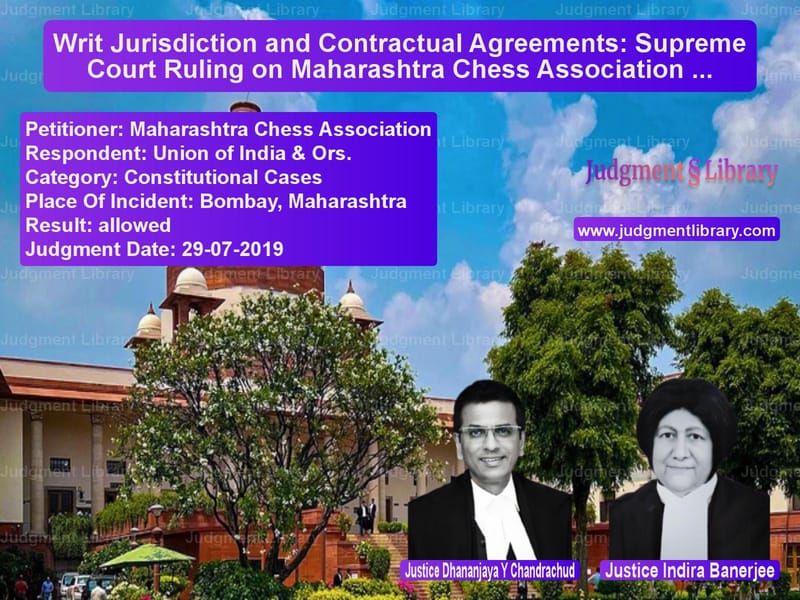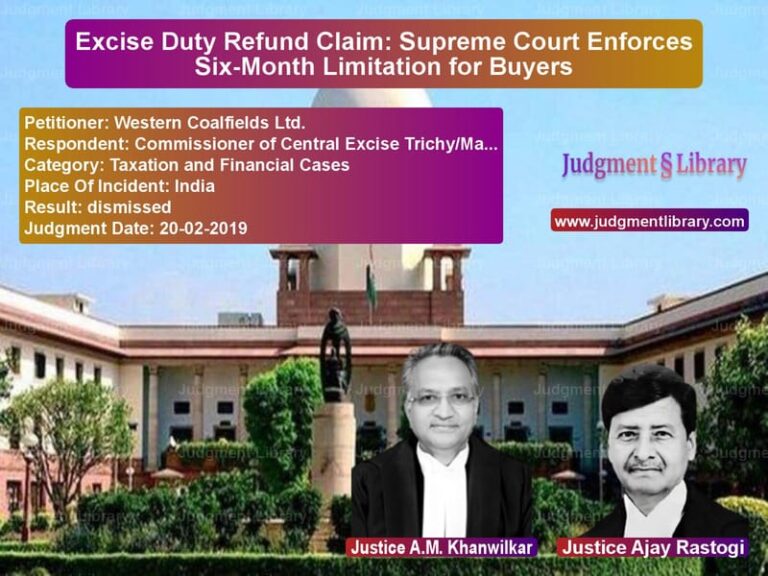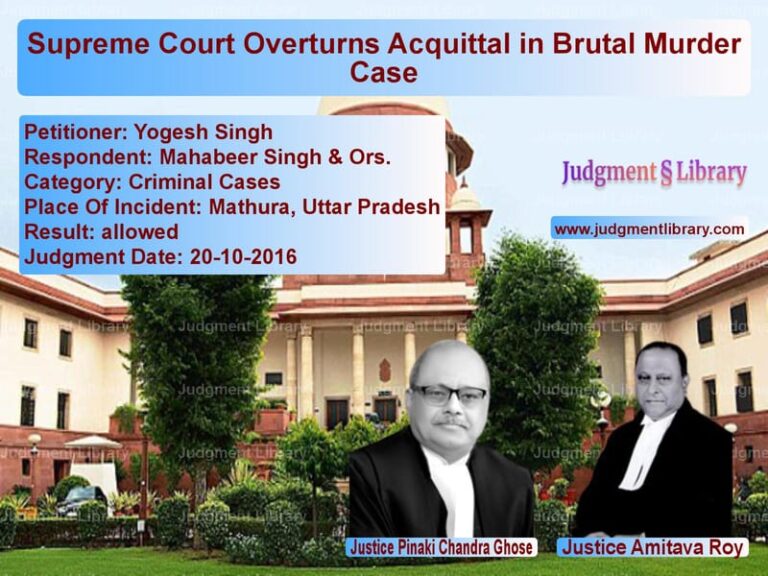Writ Jurisdiction and Contractual Agreements: Supreme Court Ruling on Maharashtra Chess Association Case
The Supreme Court of India, in a significant judgment, addressed the critical issue of whether a private agreement between parties can oust the writ jurisdiction of a High Court. The case, Maharashtra Chess Association v. Union of India & Ors., revolved around Clause 21 of the Constitution and Bye-laws of the All India Chess Federation (AICF), which designated the courts at Chennai as the exclusive forum for legal disputes. The judgment is a landmark ruling on the interpretation of writ jurisdiction under Article 226 of the Constitution and contractual agreements that attempt to limit court access.
Background of the Case
The Maharashtra Chess Association (MCA), a society registered under the Societies Registration Act, 1860, had been an affiliated member of the AICF since 1978. However, on December 25, 2016, the AICF’s Central Council passed a resolution disaffiliating MCA and replacing it with another entity. Aggrieved by this decision, MCA filed a writ petition in the Bombay High Court under Article 226 of the Constitution, challenging the disaffiliation.
The AICF objected to the maintainability of the writ petition, arguing that Clause 21 of its Constitution and Bye-laws conferred exclusive jurisdiction on the courts at Chennai. The Bombay High Court accepted this argument and dismissed MCA’s writ petition, ruling that its jurisdiction was ousted by the contractual clause.
Key Issues Before the Supreme Court
- Whether Clause 21 of the AICF Constitution and Bye-laws, which designates Chennai as the exclusive jurisdiction for legal disputes, can bar the Bombay High Court’s writ jurisdiction.
- Whether parties can, through a contractual agreement, exclude the jurisdiction of a High Court under Article 226.
- The scope and discretionary nature of the writ jurisdiction of High Courts.
Arguments by the Petitioner (Maharashtra Chess Association)
MCA, through its counsel, contended that:
- Article 226 provides a constitutional remedy that cannot be ousted by private agreements.
- The writ jurisdiction of High Courts extends to ensuring the enforcement of fundamental and other legal rights.
- Parties cannot contractually exclude the power of a High Court to review actions that may violate constitutional or statutory provisions.
- The Bombay High Court erred in holding that Clause 21 created an absolute bar on its jurisdiction.
Arguments by the Respondents
The Union of India and the AICF, represented by their legal counsel, argued that:
- The contractual clause was valid as it merely designated one of the multiple competent courts for dispute resolution.
- The Bombay High Court had exercised its discretion appropriately by not entertaining the writ petition.
- There was no violation of fundamental rights warranting interference under Article 226.
- MCA had other legal remedies available, including approaching the courts at Chennai.
Supreme Court’s Judgment
The Supreme Court, in a judgment authored by Justice Dhananjaya Y Chandrachud, reversed the Bombay High Court’s ruling and reinstated MCA’s writ petition for fresh consideration. The Court made several important observations:
“The writ jurisdiction of a High Court under Article 226 is a constitutional power that cannot be ousted by private agreements between parties.”
The Court further held:
“While contractual clauses selecting a jurisdiction among multiple competent courts are valid in civil disputes, they cannot override constitutional remedies.”
It emphasized that High Courts have a duty to ensure the rule of law within their territorial jurisdiction and cannot be restrained from reviewing cases simply because of a contractual clause.
Key Takeaways from the Ruling
- High Court’s Discretionary Power: The decision to exercise writ jurisdiction is discretionary, but it cannot be removed through private agreements.
- Public Law vs. Private Contracts: While private contracts can designate jurisdiction in civil cases, they cannot limit constitutional remedies like writ jurisdiction.
- Judicial Review as a Fundamental Principle: The Court reaffirmed that judicial review is part of the basic structure of the Constitution and cannot be contractually restricted.
- Implications for Sports and Association Disputes: The ruling impacts governance in private associations and societies, ensuring that unfair decisions can be challenged under writ jurisdiction.
Conclusion
The Supreme Court’s judgment in this case sets a crucial precedent regarding the limits of contractual jurisdiction clauses in the context of constitutional remedies. The ruling reinforces that private agreements cannot restrict the power of High Courts to exercise writ jurisdiction under Article 226. It ensures that individuals and organizations retain their right to challenge arbitrary actions before the High Courts, safeguarding the rule of law and constitutional principles.
Petitioner Name: Maharashtra Chess Association.Respondent Name: Union of India & Ors..Judgment By: Justice Dhananjaya Y Chandrachud, Justice Indira Banerjee.Place Of Incident: Bombay, Maharashtra.Judgment Date: 29-07-2019.
Don’t miss out on the full details! Download the complete judgment in PDF format below and gain valuable insights instantly!
Download Judgment: Maharashtra Chess As vs Union of India & Ors Supreme Court of India Judgment Dated 29-07-2019.pdf
Direct Downlaod Judgment: Direct downlaod this Judgment
See all petitions in Fundamental Rights
See all petitions in Public Interest Litigation
See all petitions in Separation of Powers
See all petitions in Constitution Interpretation
See all petitions in Legislative Powers
See all petitions in Judgment by Dhananjaya Y Chandrachud
See all petitions in Judgment by Indira Banerjee
See all petitions in allowed
See all petitions in supreme court of India judgments July 2019
See all petitions in 2019 judgments
See all posts in Constitutional Cases Category
See all allowed petitions in Constitutional Cases Category
See all Dismissed petitions in Constitutional Cases Category
See all partially allowed petitions in Constitutional Cases Category







